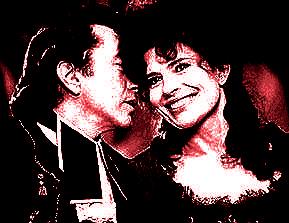Film Review

There are two things in particular that make Ridicule one of Leconte's best films - its visual impact and its extremely well-written screenplay. The set and costume design are exemplary and evoke not just the period in which the film is set but also the unimaginable vanity and effete absurdity of the class who inhabited a gold-lacquered bubble of privilege, completely oblivious to the storm of social unrest that was brewing around them. Thierry Arbogast's sumptuous cinematography is particularly effective at driving home the film's moral point, showing us not only the surface splendour of the royal court but also the sickness that lay beneath it. You can almost smell the sickly odour of corruption that permeates the perfumed drapes and gilded salons. Rémi Waterhouse's superlative screenplay, which was apparently inspired by the writings of Versailles habitué Adèle d'Osmond, comtesse de Boigne, draws a clear distinction between the progressive aristocrats, who saw social change as inevitable, and their posturing let-them-eat-cake counterparts, who were too busy preening themselves and sucking up to the monarchy to have the slightest regard for the lower social classes. What is so clever about Waterhouse's script is that whilst this latter species of aristo act as though they believe themselves to be the very acme of cultural sophistication, we perceive them for what they really are - deluded, vainglorious fools with absolutely no sense of irony. They deify Voltaire and constantly try to emulate his wit with their finely chiselled bons mots, but they fail to see that in doing so they reveal themselves to be precisely the class of worthless narcissistic parasite that the writer despised.
Perhaps the greatest kick the film offers is its abundance of acting talent, with every cast member perfectly matched to his or her role. Who better to play the smouldering Madame de Blayac, the film's most sensual character, than the irresistible Fanny Ardant? The casting of Jean Rochefort as the cultivated and compassionate Marquis de Bellegard is just as felicitous and brings to the film something of the gravitas of that other great Rochefort-Leconte collaboration, Le Mari de la coiffeuse (1990). With his heroic profile, Charles Berling is equally well suited to play Ponceludon de Malavoy, the humane aristocrat who, in his crusade for social reform, finds himself in the unenviable position of choosing between the succulent Fanny Ardant and the ravishing Judith Godrèche (thereby proving himself the model for subsequent French political leaders). Bernard Giraudeau provides the most entertainment value as the L'Abbée de Vilecourt, a shark in priest's clothing who delights in carving up his opponents with his merciless rapier wit. With such a distinguished cast, all performing at their best and relishing every line of dialogue, the film could hardly fail to please.
Ridicule was both a major commercial and critical success for Leconte, taking 2.5 million dollars at the box office and attracting an audience in France of just over two million. It was nominated for twelve awards at the 1997 Césars ceremony, winning in four categories: Best Film, Best Director, Best Costume Design and Best Art Direction. The film also won the BAFTA award for the Best Foreign Language Film and was nominated for an Oscar. Whilst the film may not be Leconte's greatest achievement - it lacks the inspired touch of Monsieur Hire (1989), the sensitivity of Le Mari de la coiffeuse (1990) and the emotional depth of Le Parfum d'Yvonne (1994) - it is undoubtedly one of his most sumptuous and entertaining offerings. With its stunning visuals, juicy performances and occasional digression into steamy eroticism (Leconte's forte), Ridicule is a pure cinematic delight. Judging by the vigour of its humorous assault on France's doomed aristocracy, it might well have been penned by Voltaire himself. You know, if Patrice Leconte did not exist, it would be necessary to invent him.
© James Travers 2011
The above content is owned by frenchfilms.org and must not be copied.
Film Synopsis
France, 1780. Grégoire Ponceludon de Malavoy is a country aristocrat and engineer who has committed himself to a drainage project that will vastly improve the lives of the poor people of his region. Unable to finance the scheme himself, he sets off for the court of Versailles to seek the patronage of King Louis XVI . On the way, he is attacked and robbed, but the kindly Marquis de Bellegarde, a physician and man of learning, comes to his aid. The Marquis is sympathetic to Grégoire's cause and advises him that the only way he will win an audience with the King is by distinguishing himself with his wit. He must humiliate his rivals with clever wordplay without making himself appear ridiculous. Having scored an easy victory over the Abbée de Vilecourt, Grégoire succumbs to the deadly charms of the seductive Madame de Blayac. When the latter learns that Grégoire is amorously involved with de Bellegarde's free-spirited daughter, she resolves to make Grégoire a laughing stock...© James Travers
The above content is owned by frenchfilms.org and must not be copied.
Similar Films
Here are some other films you may enjoy watching:- La Princesse de Montpensier (2010)
- Les Herbes folles (2009)
- Vénus et Fleur (2004)
- Paris (2008)
- Thomas est amoureux (2000)
Other related links:
Film Credits
- Director: Patrice Leconte
- Script: Rémi Waterhouse, Eric Vicaut, Michel Fessler
- Cinematographer: Thierry Arbogast
- Music: Antoine Duhamel
- Cast: Charles Berling (Le Marquis Grégoire Ponceludon de Malavoy), Jean Rochefort (Le Marquis de Bellegarde), Fanny Ardant (Madame de Blayac), Judith Godrèche (Mathilde de Bellegarde), Bernard Giraudeau (L'Abbée de Vilecourt), Bernard Dhéran (Monsieur de Montalieri), Carlo Brandt (Le Chevalier de Milletail), Jacques Mathou (Abbé de l'Epée), Urbain Cancelier (Le Roi Louis XVI), Albert Delpy (Baron de Guéret), Bruno Zanardi (Paul), Marie Pillet (Charlotte), Jacques Roman (Chevernoy), Philippe Magnan (Baron de Malenval), Maurice Chevit (Le Notaire), Jacques-François Zeller (Maurepas), Gérard Hardy (Victor), Marc Berman (Duc de Guines), Philippe du Janerand (Le Généalogiste), Claude Derepp (Mgr d'Artimont)
- Country: France
- Language: French
- Support: Color
- Runtime: 102 min
The best of Indian cinema

The best French Films of the 1920s

The best of Japanese cinema
